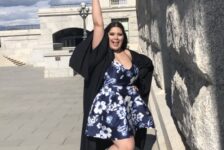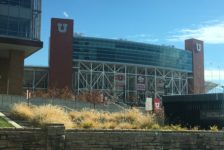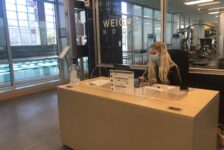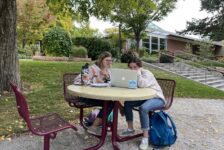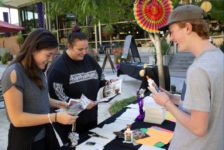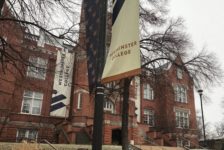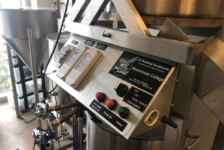For the first time in nearly two decades, the seat for Utah’s 1st District is an open race — marking it as the only congressional election in Utah this year without an incumbent running.
Rep. Rob Bishop, who currently holds the seat, announced he would not be running for re-election in 2019. Now, two candidates are facing off to represent the northern Utah district.
Blake Moore, the Republican candidate, is a Utah businessman and former foreign service officer for the U.S. Department of State. Because of the heavy GOP backing in the district, Moore is favored to win in the November election.
Moore will face Democrat Darren Parry, a former Shoshone tribe chairman, who says he will prioritize representing marginalized communities.
The two candidates agree on several campaign issues, but differ on some areas regarding public lands and coronavirus federal aid. After the debate Thursday, both Moore and Parry attempted to separate themselves on the issues to convince voters why they should be elected.
Read below to see where the candidates stand on the issues that were discussed during the Thursday debate. For a recap on the highlights, listen to the newest episode of Behind the Ballot on our Spotify, SoundCloud or Apple Podcasts.

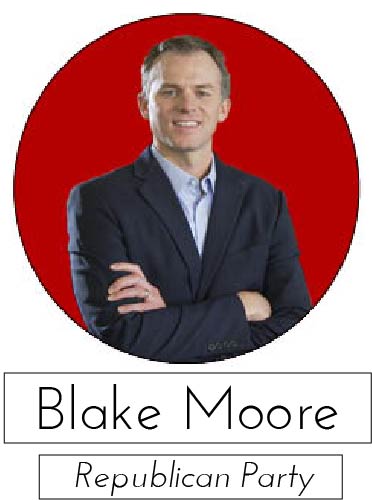
Throughout Thursday’s debate, Moore emphasized the idea that Americans should expect more from Congress — promising to represent rural Utah in Washington, DC.
However, Moore doesn’t live in the 1st Congressional District himself.
Although he said he wishes he lived there, he noted that several Congressmembers don’t live in the district they represent. For example, both Rep. Ben McAdams and Republican candidate Burgess Owens don’t live in the 4th Congressional District despite competing for the seat.
Despite this, Moore said he would be “an energetic candidate” that would “pound the pavement” to serve his district.
Q: Should the Senate vote to fill Ruth Bader Ginsburg’s vacant Supreme Court seat ahead of the election?
Moore said he supports the move to nominate and confirm a new justice to the Supreme Court before the presidential election, noting it’s a decision that should be based on the Constitution. Otherwise, it “becomes political,” he said.
However, he said he does not support stacking the Supreme Court — regardless if it’s to a conservative or liberal advantage.
Q: Would you take the COVID-19 vaccine once it became readily available?
Yes. In fact, Moore said he supports increased federal funding to speed up the process of developing a vaccine.
Q: Is there too much or not enough military funding?
Moore disagrees that there’s “too much” federal funding going toward the U.S. military. The country needs to continue being on “the cutting edge,” he said.
He disagreed with Parry on this point, noting that the answer is not to direct the money elsewhere — it’s to balance the budget to ensure all priorities are getting appropriate funding.
Q: How would you promote racial justice?
The biggest issue facing the country in terms of racial justice, Moore said, is that Americans focus on fixing “the symptoms” rather than the root cause.
What is the cause? Intergenerational poverty, Moore said.
This issue causes Black Americans to be more likely to get caught up in crime and have run-ins with the police, according to Moore.
Q: How would you protect against wildfires in Utah that we are seeing along the West Coast?
The answer to preventing mass wildfires is relying on expert management, Moore said. Part of that includes fewer politicians getting involved with those decisions.
Wildfire prevention also requires individual efforts from Utahns, Moore said, by reducing their actions that contribute to global warming.
Q: Should there be another COVID-19 stimulus package?
Moore said the financial aid stimulus package Congress passed in March was concerning because it sent money in all directions, when instead it should focus on specific industries that need it the most. Because of that, several small businesses suffered, he said.
Now, Moore said he “is hopeful” the U.S. doesn’t need another stimulus package.

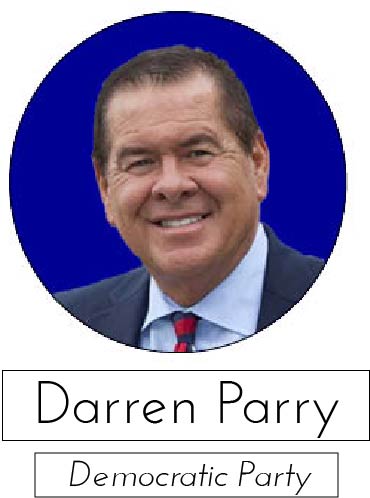
Parry said his background has equipped him to serve Utah’s 1st District, representing all demographics.
Through his Shoshone heritage, Parry said he’s been surrounded by strong women who taught him how to be a leader. Additionally, he said that his faith in the Church of Jesus Christ of Latter-day Saints has shaped his Democratic political beliefs.
Pointing to his tribal leadership experience, Parry said he has spent his life building bridges between communities. He said the issues the country faces today aren’t Republican or Democrat problems — they’re “American problems.”
Q: Should the Senate vote to fill Ruth Bader Ginsburg’s vacant Supreme Court seat ahead of the election?
Parry said he doesn’t think Ruth Bader Ginsburg’s replacement should be chosen during an election year — which he noted is what GOP senators argued ahead of the 2016 election.
The candidate said Republicans have now changed their minds.
“I don’t know why it’s different,” Parry said. “The American people should have a say.”
Q: Would you take the COVID-19 vaccine once it became readily available?
Yes. Like his opponent, Parry said he also supports increased federal funding to speed up the process of developing a vaccine.
Q: Is there too much or not enough military funding?
Parry said he believes there’s too much military funding, noting the priorities are “a little out of place.”
Instead, funding should go toward marginalized communities because a country is “only as strong as the most vulnerable” among them.
Q: How would you promote racial justice?
As someone who has experienced racial injustice firsthand, Parry said he would prioritize bringing all voices to the table — ensuring all perspectives are heard.
Parry said these racial biases are deeply ingrained in society. When the U.S. founders drafted the Constitution, Parry said the words “all men are created equal” only pertained to white men.
“As long as you’re not Black. As long as you’re not Native American,” he said. “We need to learn from the past.”
To do this, the country must address its racial biases, Parry said.
Q: How would you protect against wildfires in Utah that we are seeing along the West Coast?
According to Parry, Utah is “lucky” it hasn’t seen mass wildfires and destruction seen along the West Coast.
Like his opponent, Parry said climate change has a huge role in the spread of fires. One solution for this could be forest management, he said.
Q: Should there be another COVID-19 stimulus package?
Parry said he believes there should be continued financial assistance because the pandemic is “still around.” If there is another stimulus, Parry said it should focus more on families and small businesses.


